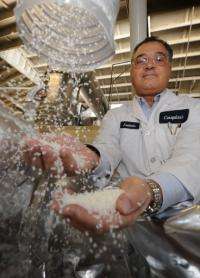Potatoes, algae replace oil in US company's plastics

Frederic Scheer is biding his time, convinced that by 2013 the price of oil will be so high that his bio-plastics, made from vegetables and plants, will be highly marketable.
Scheer, 55, is the owner of Cereplast, a company that designs and makes sustainable plastics from starches found in tapioca, corn, wheat and potatoes.
He has believed for the past 20 years that the price of oil will eventually make petroleum-based plastics obsolete and clear the way for his alternative.
"The tipping point for us is 95 dollars a barrel," he said. At that price "our product becomes cheaper" than traditional plastic.
"The day where we hit 95 dollars a barrel I think all of a sudden you're going to see bio-plastics basically explode," he said.
According to Scheer, once oil prices are consistently that high, which he expects to be the case around 2013, major chemical companies like Dupont and BASF will have no choice but to join him in bio-plastics.
By 2020, he expects the US market for the plastics to be worth 10 billion dollars, up from its current value of about a billion dollars.
The world market for traditional oil-based plastics is worth 2,500 billion dollars.
Cereplast, which has 25 employees in California and in Indiana, has accumulated a series of patents for the technology it uses to create the bio-plastics.
With annual sales of five million dollars, Cereplast manufactures resins that biodegrade naturally within three months for use in products including cups, plastic lids and packaging.
They also produce "hybrid" resins of polypropylene that are stronger and more durable, for use in cars or children's toys.
"In using our resin, we basically inject up to 50 percent agricultural renewable resources... giving them a better carbon footprint," said Scheer.
"Each time you create one kilo of traditional polypropylene, you create 3.15 kilos of carbon dioxide. When we create one kilo of bio-propylene, we create 1.40 kilos of carbon dioxide, so clearly you have a substantial saving with respect to greenhouse gases, creating a much better carbon footprint for the product," he said.
Creating plastics that are biodegradable is key, Scheer says, because just 3.5 percent of polypropylene plastic in the United States gets recycled.
Around 70 percent of all plastic waste "ends up in landfills and stays there a very long time," he said.
Americans go through 110 billion plastic or plastic-covered cups each year, using and discarding what the Food Packaging Institute describes as "astronomical numbers" of disposable containers.
"It takes between 70 to 100 million years to make fossil fuel and you are going to use your cup at Starbucks for 45 minutes max," said Scheer.
But using potatoes and corn to produce billions of tonnes of bio-plastics might not be the most sustainable business plan either, as spikes in food prices in 2008 illustrated.
So Scheer is also looking at algae.
"Algae presents the same kind of physical and thermal property that we find in starches," he said. "We can grow algae extremely fast, in very large quantities, at a very low price."
Cereplast hopes to offer a plastic made with algae for commercial sale by the end of 2010 and is projecting its annual sales will have doubled by then.
The success is bittersweet for Scheer, who was born in Paris but has become known as the one of the "grandfathers" of the bio-plastics industry in the United States, rather than his home country.
"The United States are a land of opportunity for the entrepreneur," he said. "I regret that France didn't give me that kind of opportunity."
(c) 2009 AFP
















